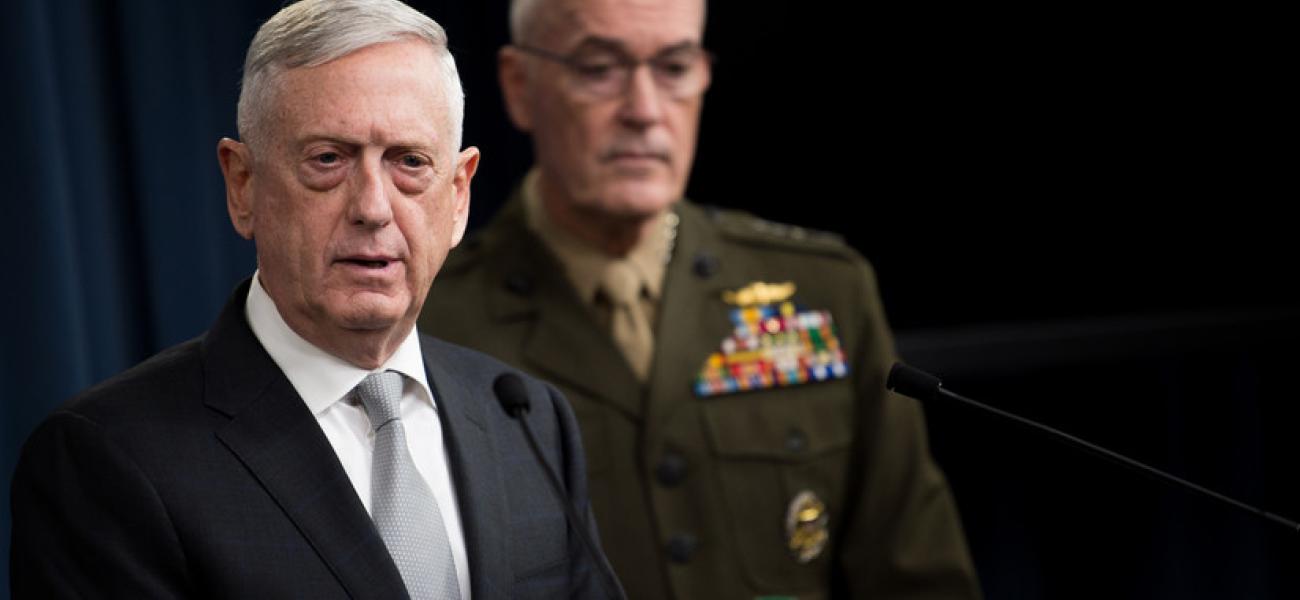In the Thick of It
A blog on the U.S.-Russia relationship
Mission Far From Accomplished in Syria: Strikes Won’t Deter Future Chemical Attacks or End Slaughter
Donald Trump’s decision to launch strikes, jointly with the U.K. and France, at what U.S. Defense Department officials described as the ''heart'' of Syrian dictator Bashar al-Assad's chemical weapons program came as no surprise. The U.S. leader had spent much of the previous week building momentum, warning Assad’s patrons in Moscow via Twitter “to get ready” for “nice and new and 'smart’” missiles after the suspected use of deadly chlorine gas by the Syrian dictator’s forces in Douma. When announcing the strikes Trump said the main purpose was to establish "a strong deterrent" against future use of chemical weapons. With a total of 105 missiles launched at three suspected chemical-weapons-related targets, Trump declared “mission accomplished.” But is it? And what should this mission be?
U.S. Ambassador to the United Nations Nikki Haley may have believed it when she said after the strikes that they had “crippled Syria's chemical-weapons program,” but I would be very surprised if the destruction of three CW facilities can put an end to the production of chemical weapons, including chlorine gas, making which, some say, is hardly rocket science. Even if the strikes did not exactly cripple the Syrian regime’s ability to produce chemical weapons, did they deter Assad from using them in the future? My guess is no. The Syrian dictator benefits in at least two ways from continued gassing of his opponents. One is that he intimidates some of them to surrender or leave without sending more of his soldiers into harm’s way. And the second is that each such use of chemical weapons widens the wedge between the U.S. and its allies on one side and Russia on the other, as such attacks have done before. The bigger the wedge, the less the already slim probability that Washington and Moscow would agree to any sort of plan for a peaceful resolution of the Syrian conflict. Assad has good reason to be concerned about any such plan as it would be far less favorable to him then the forceful solution he is trying to impose with Moscow’s and Tehran’s support.
But what’s good for Damascus is not necessarily good for Moscow … or for Washington. While Assad may benefit from a direct conflict between the U.S. and Russia, as Fidel Castro once tried to during the Cuban Missile Crisis, neither U.S. nor Russia stand to benefit from deepening animosities over Syria if only because an escalation of bilateral tensions increases the risk of accidental war. There are conflicting reports on whether the U.S. alerted Russia about the upcoming strikes and, if so, using what channels. For instance, according to RFE/RL, chairman of the Joint Chiefs of Staff Joseph Dunford said Russia had not been notified before the strikes, but that normal “deconfliction channels” had been used for “airspace issues.” Alerted or not, no Russian personnel was hit in the strikes, though Trump had apparently weighed targeting Russian assets in Syria. According to the Wall Street Journal, late last week Trump pressed his national security team to “consider strikes on Russian and Iranian targets in Syria” when deliberating strike options. In the end U.S. Secretary of Defense Jim Mattis convinced Trump to opt for a more limited strike, so the world was spared from learning whether Russia’s chief of the General Staff Valery Gerasimov had been bluffing when he vowed in March that “if the lives of Russian officers are threatened [in Syria], the Armed Forces of the Russian Federation will retaliate against missile and launch systems.” However, this does not mean that Trump will show similar restraint if another chemical-weapons attack occurs in Syria. Moreover, as suggested by a recent Washington Post story on how Trump thought he was expelling as many Russian diplomats as European allies over the suspected use of a chemical weapon against the Skripals, Trump may not always grasp the precise nature of the response options presented to him. Even if America’s commander-in-chief does not err when picking among options during another Syrian chemical-weapons crisis, there are still multiple things that can go deadly wrong on lower levels, as the Cuban Missile Crisis has taught us.
It is imperative, therefore, if the U.S. and Russia want to avoid stumbling into a war, that the sides rigorously use the existing deconfliction channels, rather than Twitter, to not only discuss “airspace issues” but also make sure they avoid significantly harming each other’s soldiers on the ground. It should also be both America’s and Russia’s mission to end the stalemate in the U.N. Security Council and empower the U.N. to conduct a thorough investigation of the use of chemical weapons in Douma and then jointly punish the perpetrators, while also pushing the conflicting sides toward a peaceful resolution of the war, perhaps along some of the lines that Ryan Crocker and Michael O'Hanlon suggest in today’s Wall Street Journal. Otherwise, if the culprit was indeed Assad as much of the publicly available evidence seems to indicate, he would be sooner or later tempted to use such weapons again, killing more innocent civilians and pushing the U.S. and Russia closer to a direct conflict that neither side wants or needs.
Photo credit: Department of Defense photo by Army Sgt. Amber I. Smith.
The opinions expressed in this blog post are solely those of the author.

